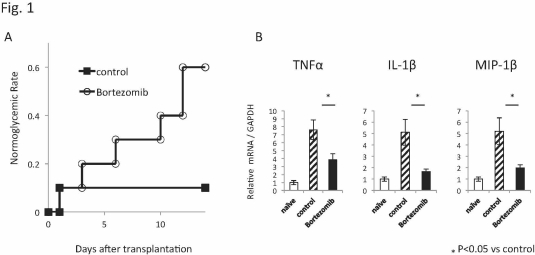Proteasome Inhibition by Bortezomib Prevents Early Graft Failure After Pancreatic Islet Transplantation
1Gastroenterological Surgery1, Hokkaido University Graduate School of Medicine, Sapporo, Japan
2Department of Pathology, Hokkaido University Graduate School of Medicine, Sapporo, Japan
3Department of Transplant Surgery, Hokkaido University Graduate School of Medicine, Sapporo, Japan
4St Mary's Hospital, Kurume, Japan.
Meeting: 2015 American Transplant Congress
Abstract number: B41
Keywords: Inflammation, Islets, Mice, Nuclear factor-kappa B (NF-kB)
Session Information
Session Name: Poster Session B: Cell Transplantation and Cell Therapies
Session Type: Poster Session
Date: Sunday, May 3, 2015
Session Time: 5:30pm-6:30pm
 Presentation Time: 5:30pm-6:30pm
Presentation Time: 5:30pm-6:30pm
Location: Exhibit Hall E
Background: Islet graft loss caused by injurious inflammatory and innate immune responses, is a major obstacle in pancreatic islet transplantation (PIT). In this pathophysiology, the NF-κB plays a key role. Proteasome regulates the activation of NF-κB through degradation of the IκB. We herein tested our hypothesis that proteasome inhibition by bortezomib (BZB) suppresses early inflammatory responses and ameliorates islet engraftment.
Methods: C57BL/6 (B6) mice islets (200 IEQ) were transplanted into streptozotocin-induced diabetic B6 mice via the portal vein. Non-fasting blood glucose (BG), intraperitoneal glucose tolerance test (IPGTT), intrahepatic pro-inflammatory cytokine mRNA expression and histology were evaluated. In vitro effects of BZB were examined using RAW264.7 macrophages and isolated B6-primary islets.
Results: Only 9% (n=11) achieved normoglycemia in the untreated control PIT recipients. In contrast, a bolus BZB (0.5 mg/kg, IV) infusion 1 hr before PIT markedly improved the normoglycemic rate to 60% (n=10: Fig. 1A). BZB treatment significantly suppressed elevation of TNF-α, IL-1β and MIP-1β mRNA expression levels in the liver at 12 hrs after PIT (Fig 1B), and ameliorated the number of viable islets at the transplant-site. BG-AUC level upon IPGTT revealed a well-maintained islet graft function after the BZB treatment (BZB: 1028±375 vs control: 1411±269 mg/dl*hr, p<0.05). BZB inhibited LPS-induced TNF-α production from RAW264.7 cells as well as pro-inflammatory cytokine mRNA expressions in islets. Activated RAW246.7 cells reduced the number of cocultured primary islets at 24 hrs, whereas administration of BZB prevented islet death .
Conclusion: Proteasome inhibition by BZB just before PITx suppresses inflammatory responses and prevents early islet graft loss following PIT.
To cite this abstract in AMA style:
Ono H, Asahi Y, Yoshida T, Koshizuka Y, Watanabe M, Tomaru U, Emoto S, Fukai M, Taketomi A, Todo S, Yamashita K. Proteasome Inhibition by Bortezomib Prevents Early Graft Failure After Pancreatic Islet Transplantation [abstract]. Am J Transplant. 2015; 15 (suppl 3). https://atcmeetingabstracts.com/abstract/proteasome-inhibition-by-bortezomib-prevents-early-graft-failure-after-pancreatic-islet-transplantation/. Accessed February 16, 2026.« Back to 2015 American Transplant Congress
